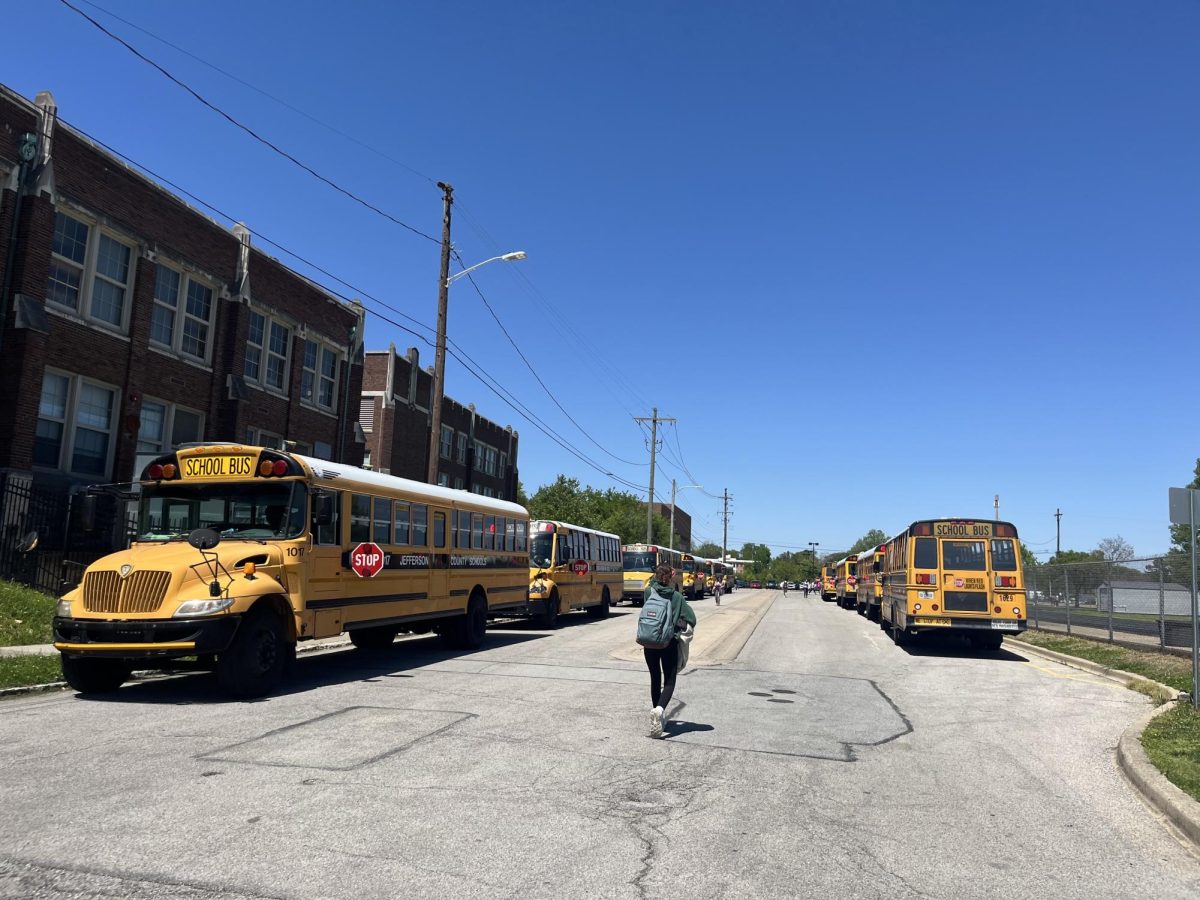In a heated meeting on April 10, the Jefferson County Board of Education voted 4-3 to end busing to most magnet and traditional schools. This will force thousands of students to find alternate transportation or transfer to their respective home schools.
The decision comes in the wake of the transportation crisis that has taken away millions of instructional minutes and caused a week-long hiatus at the beginning of the 2023-2024 school year.
Just one week prior to the April 10 decision, the Board of Education released a four-minute video outlining their “Goals and Guardrails,” setting expectations for their handling of upcoming transportation decisions. Unfortunately for JCPS students and stakeholders, the board’s recent actions suggest that these standards are not being legitimately considered.
In their Goals and Guardrails statement, the JCPS School Board emphasized that “as representatives of the community,” they wanted to capture the thinking of its members. Yet, their handling of the district’s transportation issues demonstrate a consistent lack of concern for the voices of those they represent.
The board handpicked a third-party company to perform an audit of JCPS in light of the 2023-24 transportation crisis. The audit, which demonstrated consistent administrative failures within JCPS, also stated that the district should not cut magnet busing.
“Doing so would be inequitable,” the report reads.
Following the audit’s release, the board called a special meeting and voted to end most magnet and traditional transportation, without time for further community input. This special meeting “communicates the board is unconcerned on community voice,” said chairperson Corrie Shull to WDRB.
As representatives, the school board has a responsibility to act on behalf of those they represent. However, as students at Manual and other magnet/traditional schools in the district question how and if they’ll make it to school next year, it has become clear that this responsibility was put on hiatus during the April 10 board meeting.
The JCPS Board of Education’s April 10 decision, which left valuable community input unheard, violates the board’s responsibility to “protect inclusive decision making,” as established in Guardrail 3. Considering the history of Louisville busing, inclusivity should be of the utmost importance to any decision made by the board.
In 1975, Louisville’s “busing to integrate” initiative began forcing schools that had historically been reserved for white students to accept minority students. Prior to this initiative, reside schools had been largely segregated, reflective of the homogenous surrounding neighborhoods. JCPS busing remains a major force in upholding the city’s desegregation.
Now, with the decision to take busing away from magnet and traditional schools, the district will be resegregated. Students in lower-income minority neighborhoods are losing their necessary mode of transportation to the magnet schools they work hard to attend.
The school board’s decision to remove transportation for magnet schools demonstrates a lack of commitment to racial equity. While supporters of the decision point to the fact that current transportation issues have a greater impact on students of color, the audit highlights the importance of magnet transportation.
The board’s further failure, ignoring the advice of the third-party audit it requested, ignores evidence that magnet transportation is equitable transportation.
The district has also failed to ensure access to enriching educational programs at every school, adding to concerns that minority students will not have the same quality of educational opportunities as white students.
All three black members of the school board voted against the plan. This racial divide, and the abandonment of the racial equity plan, demonstrates the school board’s lack of concern for the district’s students of color, and violates Guardrail 2, “Protect Racial Equity,” and Guardrail 3, “Protect inclusive decision making.”
Ultimately, there is no denying that this decision can and will negatively impact JCPS’ minority students. By silencing community input and disproportionately burdening minority families, the board is digging a deeper and deeper hole for the future of JCPS transportation. More importantly, the board is disregarding the views of the community it is meant to serve.
As a publication dedicated to serving our school and surrounding community, the staff of Manual RedEye is disappointed by the irresponsible and harmful decisions made by the leaders appointed to serve us. Our community deserves better. JCPS students deserve busing, and the JCPS community deserves leaders who will hold themselves accountable to their promises.








